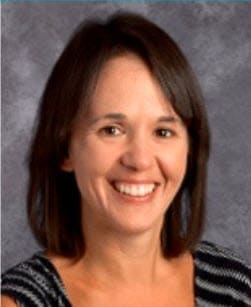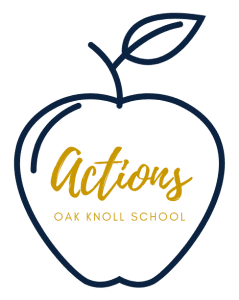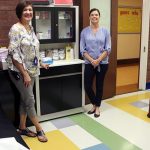Q&A: Nicole Johnston, Upper School History Department Chair
Nicole Johnston
Upper School History Department Chair
Q: Why is it exciting to be part of the History Department right now?
A: It is always exciting to be part of the History Department. During elections or times when history is a focus on the news, our department tends to receive more attention. As history teachers, we recognize that history is all around us every day. Not everything that takes place today will all be taught in the years to come, but history connects us to the past.
Q: What are some of the historical themes and important topics students can expect to learn this year in middle and high school at Oak Knoll?
A: At Oak Knoll, students look at history on a global and national level. They use historical thinking skills such as continuity and change, cause and effect, and comparison. Our classes move past looking at history from the eyes of the victor and strive to tell the stories of history from multiple perspectives.
Q: At Oak Knoll, students take part in an advisory period every day. How do you use this time to address current events happening now in our country through a historical lens?
A: Advisory is not usually used to discuss current events. Because this is an election year, however, we have used advisory period to teach communication skills surrounding the election and difficult topics. I created a five-week unit, for example, on Civil Discourse for advisories to use. Each week focuses on a different topic.
- Week 1: When People Forget to Listen – Students took a survey assessing their dialogue score, read, and discussed a story of a Muslim and Christian leader who were sworn enemies and then found a common ground to start a friendship.
- Week 2: Active Listening – Students worked with a partner on their active listening skills. For two minutes a student would sit and listen to their partner talk about any topic. The listener could not interrupt, talk, or ask a question. Then the partners switched roles. This was to teach students what happens when we listen to listen, rather than not listen to respond.
- Week 3: Evaluating Sources – Social media has led to the spread of many rumors and falsehoods. This week provided students lessons on evaluating sources they find on the internet and/or through social media.
- Week 4: Asking Authentic Questions – Students learned the importance of phrasing when asking questions. The key to this lesson was how to ask questions that will lead to dialogue and learning, rather than asking pointed questions that seem like an attack and lead to divisiveness.
- Week 5: Finding Middle Ground – This week focused on issues that tend to divide the country with people taking sides on complete opposite ends. The goal of this lesson was to commit to dialogue and not debate, to learn from the other side, and to discuss the idea, not the person. The YouTube Series “Middle Ground” was used as a supplement.
Q: The election is obviously a timely topic with regards to the history of our nation. What specific lessons are you building into OKS History classes with regard to the election and will you continue to examine post-election results? Does the History Department offer students the opportunity to practice debate?
A: History classes are bringing in the election as it relates to the curriculum. AP Comparative Government and Politics is analyzing the election in comparison to the way the 6 core countries we study run their elections. Students discuss the importance of elections bringing legitimacy to a government and the electoral process (parliamentary v. presidential, single-member district v. proportional representation, one-party system v. two-party system v. multi-party system). Post-election, students will analyze the percentage of voters and compare it with other countries. AP United States History is analyzing the election from a historical perspective by comparing it to other elections in our nation’s past. Students do have opportunities to debate within their history classes. These debates are not for current events, but rather historical events. The debates provide the opportunity for students to look at multiple perspectives of an event.
Q: What is your favorite part of history? (or teaching history?)
A: I love history because it is true that history repeats itself. I also understand, and I hope my students understand, that to understand ourselves and where we are going in the future, we need to know our past – the good, bad, and the ugly. The same is true about history. To understand our country or any country and where it is heading, we need to know all about its past.
Nicole Johnston has taught history at Oak Knoll’s all-girls’ Upper School since 2009. In 2018, she was inducted into Hackensack Meridian Health’s third annual Women Who Rock Hall of Fame and was chosen as a 2014-15 Teacher of the Future by the National Association of Independent Schools. Johnston was also one of just 46 educators across the globe to be named to the 2015 list of emerging leaders by the Association for Supervision and Curriculum Development. In 2018, she presented “Invisible Issues: Addressing Humanitarian Crises through Interdisciplinary Learning,” at the National Coalition of Girls’ Schools’ annual conference. Johnston is currently a consultant for the Center of Curriculum Redesign at Harvard University’s Graduate School of Education.



 </a Actions is a new editorial feature from Oak Knoll School of the Holy Child. Each week we will spotlight the dedicated faculty and staff across the PK-12 campus who make a difference in the lives of OKS students and the life of the school. This week, we feature:
</a Actions is a new editorial feature from Oak Knoll School of the Holy Child. Each week we will spotlight the dedicated faculty and staff across the PK-12 campus who make a difference in the lives of OKS students and the life of the school. This week, we feature:


